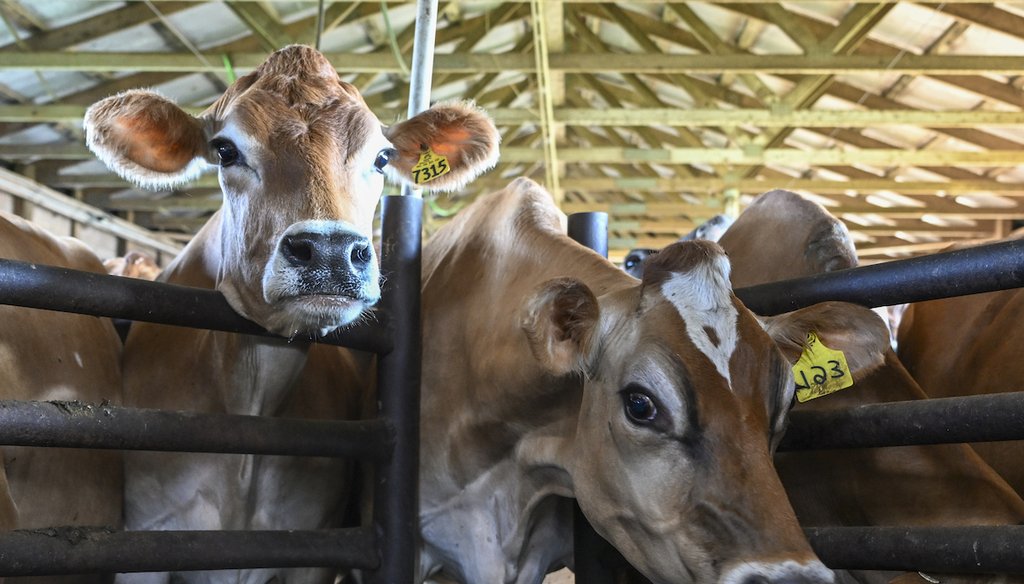

Our only agenda is to publish the truth so you can be an informed participant in democracy.
We need your help.


Jersey dairy cows line up in the milking parlor at the Dutch Hollow Farms, Sept. 20, 2022, in Schodack Landing N.Y. (AP)
The state is gradually lowering the threshold for overtime pay for farmworkers, and is offering refundable tax credits to cover the cost as the threshold falls below 60 hours per week. The threshold will reach 40 hours in 2032.
Overtime pay for work beyond 60 hours per week is the responsibility of the farm owner.
The tax credits are included in the state budget. They are not designed to end, but a future legislature could eliminate them.
In attacking Gov. Kathy Hochul’s record on economic development, Rep. Lee Zeldin pointed to farmers who worry about a change in overtime rules for their workers.
Farmworker overtime rules have been the source of much debate across the state, and the issue came up during a gubernatorial debate between the Democratic governor and Zeldin, the Republican nominee from Long Island trying to unseat her in the Nov. 8 general election.
In 2020, farmworkers became eligible for overtime pay in New York State when working more than 60 hours a week. This overtime pay, at 1.5 times their wages, is paid for by their employers. On Sept. 30, the state Labor Department instituted a 10-year schedule for phasing in overtime pay for work below the 60-hour threshold, ultimately ending in 2032 at a threshold of 40 hours per week. Farmworkers will earn overtime pay for work above 56 hours beginning Jan. 1, 2024, then in durations that diminish by four hours every other year, until the threshold reaches 40 hours in 2032.
During the only debate in the governor's contest, Zeldin said "we shouldn’t be lowering the (farmworker) overtime threshold."
Hochul, an Erie County Democrat campaigning for her first full-term as governor, said farmers won’t have to pay to cover overtime costs under the new rules. She was referring to refundable tax credits contained in the state budget passed in April.
"You mention the farmers," Hochul said. "I think you might have overlooked our information on how we are absorbing the costs of the overtime for our farmers. They don’t have to pay any more. The individuals who work for them will be paid more. The state has made a commitment because part of our national security and our economic security is to have family-owned farms here in the state of New York."
We wondered whether Hochul’s claim -- that the rule change would not affect farmers’ bottom lines -- is correct.
The tax credits were included in the 2022-23 budget and will be available to farmers in 2024, once the overtime threshold drops below 60 hours. The credits did not include a sunset provision, meaning that they are not scheduled to end. However, as with most legislative items, as lawmakers give tax credits, they can also take them away in future budgets.
The tax credit is worth 118 percent of an employee’s overtime pay, to cover additional expenses associated with larger paychecks, such as workers’ compensation and taxes. Pay for work above 60 hours per week will still be the responsibility of the employer, according to Richard Stup, an agricultural workforce specialist with Cornell Agricultural Workforce Development at Cornell University.
The tax credit is provided for farmers who are paying state-required overtime, not overtime a farm owner pays voluntarily to workers outside the bounds of the state requirements, according to Stup.
Zeldin responded to Hochul during the debate that the tax credits written into the budget are for just one year.
We reached out to the New York Farm Bureau, and a spokesman said the tax credit provision is not scheduled to be phased out, but that it could be eliminated in a future budget.
"That is a concern that farmers have, that the tax credit could go away in a future budget while the lower overtime threshold would remain," said Steve Ammerman, director of communications.
Hochul, in response to criticism about the state lowering the overtime threshold for farmworkers from 60 hours per week to 40 hours per week, said that farm owners didn’t have to pay for the recent changes to overtime rules.
The enacted state budget for 2022-23 includes refundable tax credits to pay the cost of the overtime as the threshold for overtime pay drops from 60 hours per week to 40 hours per week over the next 10 years.
As with other legislative items, as the State Legislature included the tax credits in this budget, lawmakers can remove them in a future budget.
In 2020, overtime pay for farm labor above 60 hours per week took effect. These tax credits do not cover the overtime costs incurred when an employee works more than 60 hours per week.
We rate Hochul’s claim Mostly True.
YouTube, "Hochul, Zeldin spar over crime, Trump in debate for New York governor," via Spectrum News/NY1, Oct. 25, 2022. Accessed Oct. 31, 2022.
Phone interview, Richard Stup, Ph.D., agricultural workforce specialist, College of Agriculture and Life Sciences, Cornell University, Oct. 27, 2022.
Email interview, Steve Ammerman, director of communications, New York Farm Bureau, Oct. 31, 2022.
Cornell University, Cornell Agricultural Workforce Development, "Research Report: How New York Farmers Adapted to 60-hour Overtime," Accessed Oct. 31, 2022.
New York State Department of Labor news release, "New York state Department of Labor commissioner Roberta Reardon announces decision regarding farm worker overtime," Sept. 30, 2022; accessed Oct. 31, 2022.
Cornell University, Cornell Agricultural Workforce Development, "NY Tax Credits for Farm Employers, Including Overtime." Accessed Oct. 31, 2022.
New York Farm Bureau brief, "Final Article VII Language in FY 22-23 Executive Budget," Accessed Oct. 31, 2022.
New York State budget bill, S8009C, Budget Article VII, Part B, Subpart C, signed April 9, 2022. Accessed Oct. 31, 2022.
In a world of wild talk and fake news, help us stand up for the facts.
